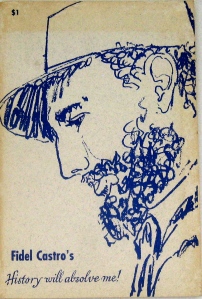The Castro Conundrum: Who Wants This Book?
S.A.
Every once in a while (or maybe even more than that), I come across an interesting vintage book, which I am compelled to buy, not always knowing why. This small volume, Fidel Castro's History Will Absolve Me!, is an example.

Published by Lyle Stuart in 1961, at 79 pages long, it is a quick read if you are interested in the volatile history of Cuba and its longtime leader, the controversial Fidel Castro. The contents of this book consist entirely of Castro's five-hour-long speech to the court, when on trial, in 1953, for leading an unsuccessful uprising against General Fulgencio Batista y Zaldivar. The speech (which I have not read in entirety), is, a first glance, complex, rich in historic detail, and even somewhat professorial in tone.
In his foreword,Robert Taber describes a meeting with Castro in 1957, where Castro described "the little book" he had written in 1953, during months of solitary confinement in jail, before his trial. Under close guard in prison, he wrote the text in lime juice, invisible, between the lines of ordinary letters in his possession.
"You would be surprised," Castro said, "how much trouble it was. I could write for only twenty minutes or so each evening at sunset, when the sun slanted across the paper in such a way as to make the letters visible, glistening on the paper." Castro's motivation, Taber writes, was to preserve the history of the defense he "delivered entirely ad lib and without the benefit even of notes."
As Taber writes, acting as his own attorney, Fidel Castro not only held the courtroom spellbound, but the book arose out of "Fidel's own ingenuity and gift of total recall," supplemented (of course) by the records of shorthand reporters present at the trial.
The book ends with Castro's memorable summation: "...I do not fear prison, just as I do not fear the fury of the miserable tyrant who snuffed life out of 70 brothers of mine. Sentence me. I don't mind. History will absolve me."
